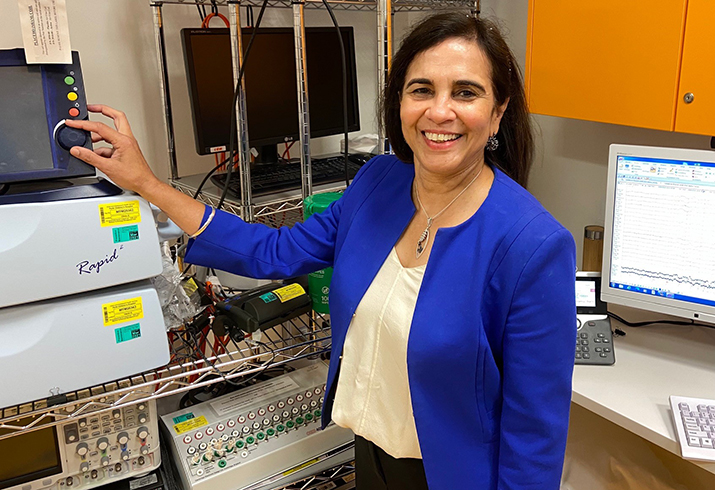Three questions with Professor Lakshmi Nagarajan

Professor Lakshmi Nagarajan, an internationally renowned child neurologist and epileptologist, has been a consultant at (the former) Princess Margaret Hospital and Perth Children’s Hospital (PCH) for more than 20 years. Dr Nagarajan directs the Child and Adolescent Epilepsy Program in Western Australia and is a Clinical Professor at the University of Western Australia’s School of Medicine.
Professor Nagarajan has fostered and advanced high quality care for children with neurological disorders across the world through her work in Australia, India, USA and Canada. She is also active in educational programs in Australia and internationally through the International Child Neurology Association (ICNA) and the International League Against Epilepsy (ILAE). She supervises and mentors Paediatric and Child Neurology trainees in Australia. Prof Nagarajan is on the ILAE task force to develop international guidelines for treatment of neonatal seizures. She is a reviewer for several peer reviewed national and international journals and has also been an invited speaker at numerous national and international conferences in neurology and epilepsy.
Professor Nagarajan has contributed to and participated in several local, national and international committees and advisory boards relating to epilepsy, child neurology, and cerebral palsy. Her main research interests are in neonatal neurology, epilepsy and neurophysiology. She has published more than 65 research papers in peer reviewed journals and published a book on neonatal seizures while working as a full-time clinician.
We posed three questions to Professor Nagarajan about her research work.
Why are you passionate about research?
I believe high quality research is integral to providing excellent, state-of-the-art clinical care.
In paediatric neurology, questions abound such as why are some children at risk of having seizures, how can we best diagnose seizures and should treatment be tailored to the individual child or be standardised?
Research helps unlock some of these mysteries and provides more effective treatment strategies for our patients. Optimal care can significantly improve the quality of life for children and their families.
Sharing rare manifestations or unique presentations of neurological disorders increases awareness and facilitates early diagnosis and intervention.
What research achievement are you proudest of?
I’m proudest of our work in the area of neonatal seizures and epilepsy, particularly the strong international response we received to this article.
Our work has helped demonstrate the best way to diagnose seizures, to understand the neural networks involved in generating the EEG signature of a seizure and its clinical correlates. We have also explored the best ways to treat and predict neurodevelopmental outcomes.
I am proud of being a member of my department - a talented team of neurologists, technologists, nurses and health professionals. I am fortunate to have friends, colleagues, mentors and collaborators in Australia and many other parts of the world. These collaborations allow me to do something I love - learning about, practising in, and promoting better understanding of child neurology and neuroscience.
What advice would you give to your younger self?
I wish I had set aside more time for research early in my career, and advocated for it in a clinical context. I have been a full time clinician throughout my medical career. I have been lucky to have been associated with and mentored by some giants in neurology who have been great role models. The importance of research to keep professionals and institutions dynamic and innovative in their thinking and providing high quality health care cannot be overstated.
I would also tell a younger me to do a course in statistics – it definitely would have come in handy.

